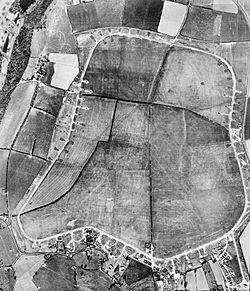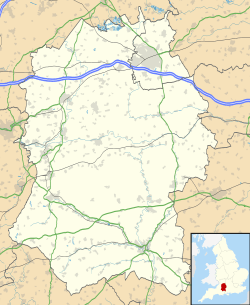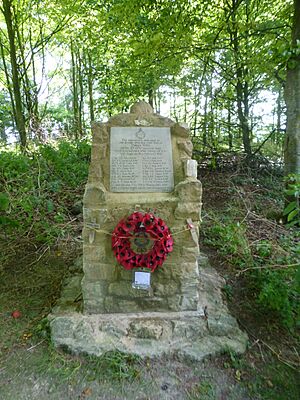RAF Zeals facts for kids
Quick facts for kids RAF ZealsUSAAF Station AAF-450 RNAS Zeals (HMS Hummingbird) |
|||||||||||
|---|---|---|---|---|---|---|---|---|---|---|---|
| Zeals, Wiltshire in England | |||||||||||

Aerial photograph of Zeals airfield: control tower, technical site and blister hangars at the bottom (south), 24 March 1944.
|
|||||||||||
|
Shown within Wiltshire
|
|||||||||||
| Coordinates | 51°05′35″N 2°19′12″W / 51.093°N 2.320°W | ||||||||||
| Type | Royal Air Force station | ||||||||||
| Code | ZL | ||||||||||
| Site information | |||||||||||
| Owner | Air Ministry Admiralty |
||||||||||
| Operator | Royal Air Force United States Army Air Forces 1943-44 Royal Navy |
||||||||||
| Controlled by | RAF Fighter Command * No. 10 Group RAF 1942-43 & 1944-45 Ninth Air Force 1943-44 Fleet Air Arm 1945- |
||||||||||
| Site history | |||||||||||
| Built | 1941/42 | ||||||||||
| In use | May 1942 - January 1946 | ||||||||||
| Battles/wars | European theatre of World War II | ||||||||||
| Airfield information | |||||||||||
| Elevation | 168 metres (551 ft) AMSL | ||||||||||
|
|||||||||||
RAF Zeals was a special airfield in Wiltshire, England. It was located north of the village of Zeals, near Stourton and the Stourhead estate. This base played an important role during World War II.
Contents
History of RAF Zeals
The airfield was open from 1942 to 1946. During this time, it was used by three different military groups. First, the Royal Air Force (RAF) used it. Then, the United States Army Air Forces (USAAF) took over. Finally, the Royal Navy used the base.
RAF Fighter Base (1942-1943)
When it first opened, RAF Zeals was a base for fighter planes. The RAF used it for their fast Hawker Hurricane and Supermarine Spitfire aircraft. These planes helped protect the skies.
Several RAF squadrons were stationed here:
- No. 66 Squadron RAF (Spitfire VB & VC)
- No. 118 Squadron RAF (Spitfire VB)
- No. 132 (City of Bombay) Squadron RAF (Spitfire VB)
- No. 174 (Mauritius) Squadron RAF (Hurricane IIB)
- No. 184 Squadron RAF (Hurricane IID)
- No. 263 (Fellowship of the Bellows) Squadron RAF (Westland Whirlwind I)
- No. 421 Squadron RCAF (Spitfire VB)
USAAF Use and Challenges (1943-1944)
In August 1943, the airfield was given to the United States Army Air Forces. They planned to use it for fixing large transport planes called Douglas C-47 Skytrains.
However, the ground at Zeals was often very wet. This made it hard for heavy aircraft to take off and land safely. So, instead of transport planes, the USAAF flew lighter Republic P-47 Thunderbolt fighter planes from the base.
Return to RAF and Night Fighters (1944)
In March 1944, RAF Zeals went back to the Royal Air Force. This time, it became a base for de Havilland Mosquito fighter planes. These Mosquitoes were used to fight against German bombers attacking Britain.
Some of the RAF units at this time included:
- No. 286 Squadron RAF (Hurricane IIc and Miles Martinet)
- No. 149 (Long Range Fighter) Wing RAF
- No. 410 Squadron RCAF (Mosquito XIII)
- No. 488 Squadron RNZAF (Mosquito XIII)
- No. 604 (County of Middlesex) Squadron RAuxAF (Mosquito XIII)
After D-Day (the invasion of Normandy), the RAF used the airfield for training. They practiced with military gliders. This training was to prepare for possible future actions against Japan.
In April 1945, the Royal Navy took over the base. They called it HMS Hummingbird, or RNAS Zeals. The Navy used the airfield to train pilots for aircraft carriers. This training helped pilots learn how to land on and take off from ships at sea.
Naval Air Squadrons that trained here were:
- 771 Naval Air Squadron (Wildcat IV)
- 704 Naval Air Squadron (Mosquito FB.6)
- 759 Naval Air Squadron (Corsair III)
- 760 Naval Air Squadron (Corsair III)
- 790 Naval Air Squadron (Firefly I and Oxford I)
Closure of the Airfield
RAF Zeals closed down in January 1946. By June of that year, the land was returned to farmers. Today, the old control tower is still there. It has been turned into a private house on Bells Lane in Zeals.
Dakota Crash (February 1945)
On February 19, 1945, a Douglas Dakota III aircraft crashed. More than twenty people lost their lives in this accident. The plane had just left Zeals airfield. It was heading back to Lincolnshire after two weeks of glider training.
The aircraft flew into some beech trees that were hidden by clouds on a small hill. A memorial has been placed at the crash site by the Wiltshire Historical Military Society to remember those who died.
Units Stationed at Zeals
Many different units were based at RAF Zeals during its time in operation. These units helped with various tasks, from training to air defense.
- Detachment of No. 3 Glider Training School RAF (1944)
- No. 122 Airfield RAF (1943)
- No. 147 Airfield (1944), which became No. 147 (Night Fighter) Wing RAF
- No. 2750 Squadron RAF Regiment
- No. 2835 Squadron RAF Regiment
- No. 2885 Squadron RAF Regiment
- No. 3205 Servicing Commando
- No. 3207 Servicing Commando
- No. 3209 Servicing Commando
- No. 3210 Servicing Commando
- No. 4018 Anti-Aircraft Flight RAF Regiment
- Glider Pick-up Training Flight RAF (1945) with Douglas Dakota and Waco Hadrian gliders
- No. 925/926 (Balloon) Squadron
- No. 949 (Balloon) Squadron
- No. 966 (Balloon) Squadron
See also
- List of former Royal Air Force stations
 | Tommie Smith |
 | Simone Manuel |
 | Shani Davis |
 | Simone Biles |
 | Alice Coachman |




